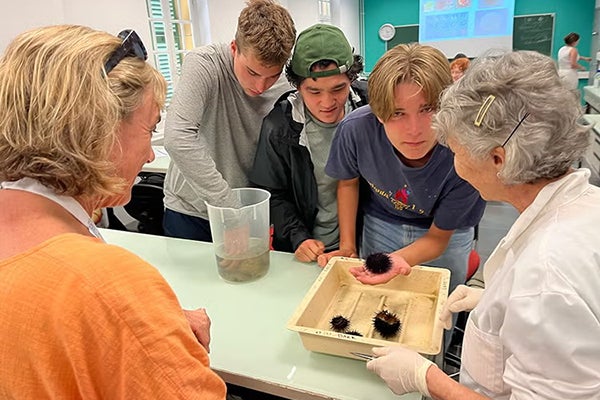Scientists Identify Genes that Help Protect Plant Genomes
The discovery holds important implications for our understanding of age-related disorders and cancers in humans.

Researchers at The University of Texas at Austin and elsewhere have identified genes in plants that help maintain protective caps on the ends of their DNA. Because the genes have analogs in the human genome, the findings may hold important implications for our understanding of age-related disorders and cancers in humans.
In a paper published this month in Nature Communications, the researchers describe the discovery in Arabidopsis thaliana, a flowering plant.
Plant and human chromosomes both have telomeres, which are protective caps on the ends of DNA like the plastic tips on shoelaces. As cells divide and humans age, these end portions of DNA grow shorter and shorter. When this process happens too quickly or the telomeres can't be replenished in time, people can develop certain diseases, including types of cardiovascular disease. Telomeres also factor into cancer, as cancer cells often evolve ways to maintain long protective caps that help them to escape aging and divide indefinitely.
While maintaining that balance between telomere shortening and lengthening is important for health, researchers don't know a lot about which genes are important for this process. Thomas Juenger, professor of integrative biology at UT Austin, Eugene Shakirov, assistant professor at Marshall and colleagues at Texas A&M, HudsonAlpha Institute for Biology and the Kazan Federal University in Russia identified several genes that impact telomere biology. For example, the gene called NOP2A plays a key role, and is involved in protein building and how quickly a cell moves through different phases of development. In connecting the protein builders, called ribosomes, and telomere biology, the research provides a new insight to help other scientists investigate how diseases and cancers evolve.
It's difficult to study the effects of turning off genes like NOP2 in humans and other animals because inactivation of these genes is lethal. Unlike humans, Arabidopsis plants have many genes that are duplicated; for example, they have two versions of NOP2, called NOP2A and NOP2B. In Arabidopsis, it's possible to turn one gene off without killing the plant. This allowed Juenger and Shakirov to determine that NOP2B, a similar gene to NOP2A, doesn't have a role in telomere biology. Being able to examine these mutations provides a better understanding of gene functions in plants, which may also carry over to human systems.
"We really couldn't even imagine doing this work in almost any other system," Shakirov said.
"There is quite a general interest in telomere biology as it has been linked to aging and cancer in humans, but I think we are probably still a long way off from having gene therapy or therapeutic treatments," Juenger said.
The research was funded by the National Institutes of Health, the National Science Foundation, the Russian Foundation for Basic Research and Kazan Federal University.



